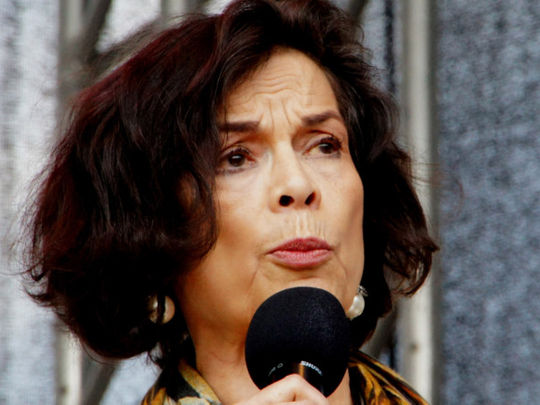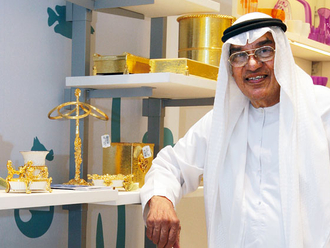
As a girl of 10, Bianca Jagger noticed how differently family friends in her native Nicaragua treated her mother to her father, Carlos Perez-Mora. He, a successful businessman, enjoyed deference and respect. Not so his ex-wife.
After their divorce Dora Macias Somarriba, a beautiful thirtysomething, was forced to support her three young children by going out to work. It was not something middle-class ladies did in 1950s Managua. But Dora ignored the snide comments; she opened a health-food restaurant — conveniently located near La Imaculata convent school, where Bianca studied.
But her daughter never forgot her mother’s hardship. “I promised myself I was never going to suffer that fate.” Bianca was the spitting image of her dashing father. “He was thin and dark-haired just like me, whereas my mother was a big, strong woman, with milky skin and auburn hair. My younger brother and sister always joked that I must have been adopted. My father always wore a white linen suit. I often wear suits, and white linen suits. I must be emulating him.”
Yet it was to Dora that Bianca looked for “my role model. I admired her independence and determination. Through her I came to understand the implications of living under a dictatorship”. Dora passionately opposed the Somoza regime that for 43 years had controlled the country. Bianca remembers demonstrating against the student massacres organised by the national guard during Nicaragua’s civil war.
“We were tear-gassed and I took refuge in a church. My father had to come and rescue me. After that, he was happy that I had decided to go to Paris on a scholarship to study political science.”
A cul-de-sac in Kensington, west London, must seem a million miles from the turmoil of central America. In the small office that serves as the headquarters of her international human rights foundation, Bianca Jagger, 63, sits at a desk piled high with books and files. The campaigner is writing her Longford Trust Lecture — aptly enough, it is on the subject of ending violence against women. (The full title is “Ending Violence Against Women and Girls, and the culture of Impunity: achieving the missing Millennium Development Goal”.)
Desmond Tutu, Jon Snow and Will Self have delivered the prestigious lecture that commemorates the late Frank Longford’s work in criminal justice. But, unlike Ms Jagger, their audience did not include Prince Michael of Kent, Livia Firth and Jemima Khan. The who’s who invitation list suggests that Bianca Jagger is no run-of-the-mill campaigner. She talks the earnest language of NGOs the world over, citing an impressive array of statistics.
“The United Nations Development Fund for Women estimates that at least one in every three women in the world has been beaten, coerced into sex, or otherwise abused. In some countries the rate is as high as 70 per cent. Even in Britain last year around 60,000 women were raped, over 400,000 were sexually assaulted and 1.2 million suffered domestic abuse, according to the Home Office. But only one in 10 serious sexual assaults was reported.”
All this is delivered in exotic and seductive tones; her sculpted face still exudes the allure that held Sir Mick Jagger (whom she married in 1971), Andy Warhol and Yves Saint Laurent in thrall. Bianca Jagger, the legend, cannot be ignored.
The woman before me would like nothing better than to explode the myths that have sprung up about her celebrated youth: she says she never rode naked on a white horse into Studio 54, the celebrity hang-out in Manhattan; she did not date Billy Joel; or while away her twenties on the catwalk. But setting the record straight would distract her from the big challenges ahead: protecting vulnerable women; protesting against fracking (the “wicked destruction of the countryside”); and shaming America into rethinking drone strikes.
Before we meet she had warned me that she would not discuss Sir Mick; she never does, although that does not stop publishers offering her lucrative deals for her version of their turbulent 9-year marriage (the couple had a daughter, Jade, now 42.)
Jagger shrugs off her frustration with our celebrity fixation to decry this country’s “double standards for men and women”, her black eyes flash as the indignation she felt at her mother’s treatment resurfaces. “A 13-year-old girl was called ‘predatory’ by Judge Nigel Peters, after a 41-year-old man admitted having sexual activity with her — you see how ingrained these perceptions are.”
She worries about the “culture of silence surrounding sexual assault”. I ask her if her passion on this stems from personal experience.
She pauses; then, quietly and very deliberately, says: “This is not about my life. It is about what I witness. Students, when I have given speeches, have confessed to me that in their institutions you’re encouraged to keep silent if you’ve been abused or raped.”
She feels she must speak for them. And for those “who do not have my access to the media. I run a four-pronged communications strategy — using Twitter, Facebook, LinkedIn and Google. I tweet in Portuguese, French, Spanish and Italian, as well as English.”
She cheerfully admits that her life is now all about work. She starts from the moment she opens her eyes in the morning: “If I can make a difference then I must do it. When the residents in Lower Stumble, Sussex, invited me through Twitter to visit them and protest against fracking in their beautiful village, I went. I unreservedly oppose fracking because of the irreparable damage it causes to the environment: earthquakes, contamination of aquifers, leakage of toxic chemicals into the ground, air pollution, increased road traffic. The risks are real and the benefits are unproven.
“I’m not surprised that people across the UK vehemently oppose it. Fracking in the UK has the fingerprints of corporate interest all over it — especially those of Lord Browne [former head of BP and chairman of the fracking company Cuadrilla], whom this government uses as an adviser. I cannot believe how this Government’s policies have been dictated by big business.”
Jagger spits out the words “this government”; she is no fan of the coalition, then? “I used to be supportive of Nick Clegg but I’m very disappointed. He hasn’t made enough of a difference.”
She feels equally disappointed by Barack Obama: “I am appalled by the US use of drones. Amnesty International has said that some of the strikes constitute war crimes, and that the officials responsible should stand trial.”
Jagger’s diligence goes beyond memorising facts and figures; she is willing to go to trouble spots. She has faced down Serb soldiers in Kosovo and a death squad in Honduras. She visited Iraq as part of a fact-finding mission during the row over WMDs (weapons of mass destruction).
As she recounts these exploits, her face lights up. She speaks in a rapid, excited voice, electrified by the memories. The sultry icon with the hard-to-please expression finally feels fulfilled.
I ask if I’m right: is she happier than ever? “Yes, why not?” She does not blink at the suggestion. “I have a mission. I’m happy that I can be useful.”
She loves living in Britain (she has become a citizen). The Latin American surprisingly finds the British “so warm: they’ve welcomed me from the first. And my family is here.” Including, of course, her ex-husband.
Would she ever marry again? She tilts the beautiful head to one side and begins, cautiously: “My marriage — it was very challenging. I feel very apprehensive about embarking on another serious relationship. It’s not one of my priorities.”
On the other hand, her daughter Jade has two grown-up daughters, Assisi and Amba. Assisi, 21, is about to make Bianca Jagger a great grandmother. A suitable companion of her own might be another welcome addition to the family? Bianca gives me a dazzling smile: “Well, one should never say never. But he would have to have a big heart and an open mind, to be able to embrace all my interests.”
Meanwhile, the indefatigable Bianca Jagger will continue to wage her battles. One of these will bring her back to where she started — Nicaragua. Its president Daniel Ortega, she tells me, “has become an autocrat. He has betrayed the aspirations of the people who fought so long and hard to free Nicaragua from the Somoza regime.”
Bianca Jagger for president? I ask, only half in jest. “I wish I had it in me to be a politician — because I can see that Nicaragua needs a new leader. But I can’t compromise my ideals. That’s not who I am.”
–The Telegraph Group Limited, London 2013












